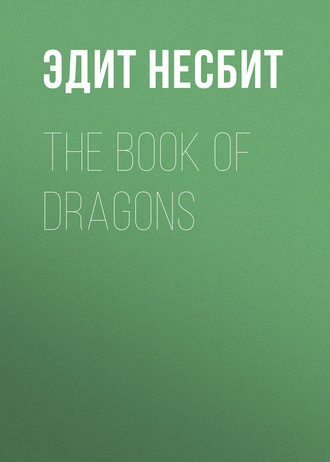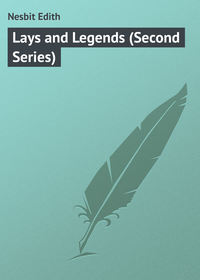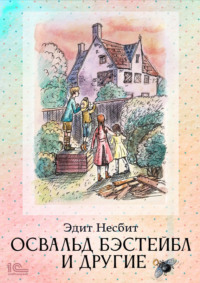 полная версия
полная версияThe Book of Dragons
But the dragon was too quick for him—it put out a great claw and caught him by the leg, and as it moved it rattled like a great bunch of keys, or like the sheet iron they make thunder out of in pantomimes.
"No you don't," said the dragon in a spluttering voice, like a damp squib.
"Deary, deary me," said poor John, trembling more than ever in the claw of the dragon. "Here's a nice end for a respectable blacksmith!"
The dragon seemed very much struck by this remark.
"Do you mind saying that again?" said he, quite politely.
So John said again, very distinctly: "Here—is—a—nice—end—for—a—respectable—blacksmith."
"I didn't know," said the dragon. "Fancy now! You're the very man I wanted."
"So I understood you to say before," said John, his teeth chattering.
"Oh, I don't mean what you mean," said the dragon, "but I should like you to do a job for me. One of my wings has got some of the rivets out of it just above the joint. Could you put that to rights?"
"I might, sir," said John, politely, for you must always be polite to a possible customer, even if he be a dragon.
"A master craftsman—you are a master, of course?—can see in a minute what's wrong," the dragon went on. "Just come around here and feel my plates, will you?"
John timidly went around when the dragon took his claw away; and sure enough, the dragon's wing was hanging loose, and several of the plates near the joint certainly wanted riveting.
The dragon seemed to be made almost entirely of iron armor—a sort of tawny, red-rust color it was; from damp, no doubt—and under it he seemed to be covered with something furry.
All the blacksmith welled up in John's heart, and he felt more at ease.
"You could certainly do with a rivet or two, sir," said he. "In fact, you want a good many."
"Well, get to work, then," said the dragon. "You mend my wing, and then I'll go out and eat up all the town, and if you make a really smart job of it I'll eat you last. There!"
"I don't want to be eaten last, sir," said John.
"Well then, I'll eat you first," said the dragon.
"I don't want that, sir, either," said John.
"Go on with you, you silly man," said the dragon, "you don't know your own silly mind. Come, set to work."
"I don't like the job, sir," said John, "and that's the truth. I know how easily accidents happen. It's all fair and smooth, and 'Please rivet me, and I'll eat you last'—and then you get to work and you give a gentleman a bit of a nip or a dig under his rivets—and then it's fire and smoke, and no apologies will meet the case."
"Upon my word of honor as a dragon," said the other.
"I know you wouldn't do it on purpose, sir," said John, "but any gentleman will give a jump and a sniff if he's nipped, and one of your sniffs would be enough for me. Now, if you'd just let me fasten you up?"
"It would be so undignified," objected the dragon.
"We always fasten a horse up," said John, "and he's the 'noble animal.'"
"It's all very well," said the dragon, "but how do I know you'd untie me again when you'd riveted me? Give me something in pledge. What do you value most?"
"My hammer," said John. "A blacksmith is nothing without a hammer."
"But you'd want that for riveting me. You must think of something else, and at once, or I'll eat you first."
At this moment the baby in the room above began to scream. Its mother had been so quiet that it thought she had settled down for the night, and that it was time to begin.
"Whatever's that?" said the dragon, starting so that every plate on his body rattled.
"It's only the baby," said John.
"What's that?" asked the dragon. "Something you value?"
"Well, yes, sir, rather," said the blacksmith.
"Then bring it here," said the dragon, "and I'll take care of it till you've done riveting me, and you shall tie me up."
"All right, sir," said John, "but I ought to warn you. Babies are poison to dragons, so I don't deceive you. It's all right to touch—but don't you go putting it into your mouth. I shouldn't like to see any harm come to a nice-looking gentleman like you."
The dragon purred at this compliment and said: "All right, I'll be careful. Now go and fetch the thing, whatever it is."
So John ran up the steps as quickly as he could, for he knew that if the dragon got impatient before it was fastened, it could heave up the roof of the dungeon with one heave of its back, and kill them all in the ruins. His wife was asleep, in spite of the baby's cries; and John picked up the baby and took it down and put it between the dragon's front paws.
"You just purr to it, sir," he said, "and it'll be as good as gold."
So the dragon purred, and his purring pleased the baby so much that it stopped crying.
Then John rummaged among the heap of old iron and found there some heavy chains and a great collar that had been made in the days when men sang over their work and put their hearts into it, so that the things they made were strong enough to bear the weight of a thousand years, let alone a dragon.
John fastened the dragon up with the collar and the chains, and when he had padlocked them all on safely he set to work to find out how many rivets would be needed.
"Six, eight, ten—twenty, forty," said he. "I haven't half enough rivets in the shop. If you'll excuse me, sir, I'll step around to another forge and get a few dozen. I won't be a minute."
And off he went, leaving the baby between the dragon's fore-paws, laughing and crowing with pleasure at the very large purr of it.
John ran as hard as he could into the town, and found the mayor and corporation.
"There's a dragon in my dungeon," he said; "I've chained him up. Now come and help to get my baby away."
And he told them all about it.
But they all happened to have engagements for that evening; so they praised John's cleverness, and said they were quite content to leave the matter in his hands.
"But what about my baby?" said John.
"Oh, well," said the mayor, "if anything should happen, you will always be able to remember that your baby perished in a good cause."
So John went home again, and told his wife some of the tale.
"You've given the baby to the dragon!" she cried. "Oh, you unnatural parent!"
"Hush," said John, and he told her some more. "Now," he said, "I'm going down. After I've been down you can go, and if you keep your head the boy will be all right."
So down went the blacksmith, and there was the dragon purring away with all his might to keep the baby quiet.
"Hurry up, can't you?" he said. "I can't keep up this noise all night."
"I'm very sorry, sir," said the blacksmith, "but all the shops are shut. The job must wait till the morning. And don't forget you've promised to take care of that baby. You'll find it a little wearing, I'm afraid. Good night, sir."
The dragon had purred till he was quite out of breath—so now he stopped, and as soon as everything was quiet the baby thought everyone must have settled for the night, and that it was time to begin to scream. So it began.
"Oh, dear," said the dragon, "this is awful." He patted the baby with his claw, but it screamed more than ever.
"And I am so tired too," said the dragon. "I did so hope I should have a good night."
The baby went on screaming.
"There'll be no peace for me after this," said the dragon. "It's enough to ruin one's nerves. Hush, then—did 'ums, then." And he tried to quiet the baby as if it had been a young dragon. But when he began to sing "Hush-a-by, Dragon," the baby screamed more and more and more. "I can't keep it quiet," said the dragon; and then suddenly he saw a woman sitting on the steps. "Here, I say," said he, "do you know anything about babies?"
"I do, a little," said the mother.
"Then I wish you'd take this one, and let me get some sleep," said the dragon, yawning. "You can bring it back in the morning before the blacksmith comes."
So the mother picked up the baby and took it upstairs and told her husband, and they went to bed happy, for they had caught the dragon and saved the baby.
And next day John went down and explained carefully to the dragon exactly how matters stood, and he got an iron gate with a grating to it and set it up at the foot of the steps, and the dragon mewed furiously for days and days, but when he found it was no good he was quiet.
So now John went to the mayor, and said: "I've got the dragon and I've saved the town."
"Noble preserver," cried the mayor, "we will get up a subscription for you, and crown you in public with a laurel wreath."
So the mayor put his name down for five pounds, and the corporation each gave three, and other people gave their guineas and half guineas and half crowns and crowns, and while the subscription was being made the mayor ordered three poems at his own expense from the town poet to celebrate the occasion. The poems were very much more admired, especially by the mayor and corporation.
The first poem dealt with the noble conduct of the mayor in arranging to have the dragon tied up. The second described the splendid assistance rendered by the corporation. And the third expressed the pride and joy of the poet in being permitted to sing such deeds, beside which the actions of St. George must appear quite commonplace to all with a feeling heart or a well-balanced brain.
When the subscription was finished there was a thousand pounds, and a committee was formed to settle what should be done with it. A third of it went to pay for a banquet to the mayor and corporation; another third was spent in buying a gold collar with a dragon on it for the mayor and gold medals with dragons on them for the corporation; and what was left went in committee expenses.
So there was nothing for the blacksmith except the laurel wreath and the knowledge that it really was he who had saved the town. But after this things went a little better with the blacksmith. To begin with, the baby did not cry so much as it had before. Then the rich lady who owned the goat was so touched by John's noble action that she ordered a complete set of shoes at 2 shillings, 4 pence, and even made it up to 2 shillings, 6 pence, in grateful recognition of his public-spirited conduct. Then tourists used to come in breaks from quite a long way off, and pay twopence each to go down the steps and peep through the iron grating at the rusty dragon in the dungeon—and it was threepence extra for each party if the blacksmith let off colored fire to see it by, which, as the fire was extremely short, was twopence-halfpenny clear profit every time. And the blacksmith's wife used to provide teas at ninepence a head, and altogether things grew brighter week by week.
The baby—named John, after his father, and called Johnnie for short—began presently to grow up. He was great friends with Tina, the daughter of the whitesmith, who lived nearly opposite. She was a dear little girl with yellow pigtails and blue eyes, and she was tired of hearing the story of how Johnnie, when he was a baby, had been minded by a real dragon.
The two children used to go together to peep through the iron grating at the dragon, and sometimes they would hear him mew piteously. And they would light a halfpenny's worth of colored fire to look at him by. And they grew older and wiser.
At last one day the mayor and corporation, hunting the hare in their gold gowns, came screaming back to the town gates with the news that a lame, humpy giant, as big as a tin church, was coming over the marshes toward the town.
"We're lost," said the mayor. "I'd give a thousand pounds to anyone who could keep that giant out of the town. I know what he eats—by his teeth."
No one seemed to know what to do. But Johnnie and Tina were listening, and they looked at each other, and ran off as fast as their boots would carry them.
They ran through the forge, and down the dungeon steps, and knocked at the iron door. "Who's there?" said the dragon. "It's only us," said the children.
And the dragon was so dull from having been alone for ten years that he said: "Come in, dears."
"You won't hurt us, or breathe fire at us or anything?" asked Tina.
And the dragon said, "Not for worlds."
So they went in and talked to him, and told him what the weather was like outside, and what there was in the papers, and at last Johnnie said: "There's a lame giant in the town. He wants you."
"Does he?" said the dragon, showing his teeth. "If only I were out of this!"
"If we let you loose you might manage to run away before he could catch you."
"Yes, I might," answered the dragon, "but then again I mightn't."
"Why—you'd never fight him?" said Tina.
"No," said the dragon; "I'm all for peace, I am. You let me out, and you'll see."
So the children loosed the dragon from the chains and the collar, and he broke down one end of the dungeon and went out—only pausing at the forge door to get the blacksmith to rivet his wing.
He met the lame giant at the gate of the town, and the giant banged on the dragon with his club as if he were banging an iron foundry, and the dragon behaved like a smelting works—all fire and smoke. It was a fearful sight, and people watched it from a distance, falling off their legs with the shock of every bang, but always getting up to look again.
At last the dragon won, and the giant sneaked away across the marshes, and the dragon, who was very tired, went home to sleep, announcing his intention of eating the town in the morning. He went back into his old dungeon because he was a stranger in the town, and he did not know of any other respectable lodging. Then Tina and Johnnie went to the mayor and corporation and said, "The giant is settled. Please give us the thousand pounds reward."
But the mayor said: "No, no, my boy. It is not you who have settled the giant, it is the dragon. I suppose you have chained him up again? When he comes to claim the reward he shall have it."
"He isn't chained up yet," said Johnnie. "Shall I send him to claim the reward?"
But the mayor said he need not trouble; and now he offered a thousand pounds to anyone who would get the dragon chained up again.
"I don't trust you," said Johnnie. "Look how you treated my father when he chained up the dragon."
But the people who were listening at the door interrupted, and said that if Johnnie could fasten up the dragon again they would turn out the mayor and let Johnnie be mayor in his place. For they had been dissatisfied with the mayor for some time, and thought they would like a change.
So Johnnie said, "Done," and off he went, hand in hand with Tina, and they called on all their little friends and said: "Will you help us to save the town?"
And all the children said: "Yes, of course we will. What fun!"
"Well, then," said Tina, "you must all bring your basins of bread and milk to the forge tomorrow at breakfast time."
"And if ever I am mayor," said Johnnie, "I will give a banquet, and you shall be invited. And we'll have nothing but sweet things from beginning to end."
All the children promised, and next morning Tina and Johnnie rolled their big washing tub down the winding stair.
"What's that noise?" asked the dragon.
"It's only a big giant breathing," said Tina, "He's gone by now."
Then, when all the town children brought their bread and milk, Tina emptied it into the wash tub, and when the tub was full Tina knocked at the iron door with the grating in it and said: "May we come in?"
"Oh, yes," said the dragon, "it's very dull here."
So they went in, and with the help of nine other children they lifted the washing tub in and set it down by the dragon. Then all the other children went away, and Tina and Johnnie sat down and cried.
"What's this?" asked the dragon. "And what's the matter?"
"This is bread and milk," said Johnnie; "it's our breakfast—all of it."
"Well," said the dragon, "I don't see what you want with breakfast. I'm going to eat everyone in the town as soon as I've rested a little."
"Dear Mr. Dragon," said Tina, "I wish you wouldn't eat us. How would you like to be eaten yourself?"
"Not at all," the dragon confessed, "but nobody will eat me."
"I don't know," said Johnnie, "there's a giant—"
"I know. I fought with him, and licked him."
"Yes, but there's another come now—the one you fought was only this one's little boy. This one is half as big again."
"He's seven times as big," said Tina.
"No, nine times," said Johnnie. "He's bigger than the steeple."
"Oh, dear," said the dragon. "I never expected this."
"And the mayor has told him where you are," Tina went on, "and he is coming to eat you as soon as he has sharpened his big knife. The mayor told him you were a wild dragon—but he didn't mind. He said he only ate wild dragons—with bread sauce."
"That's tiresome," said the dragon. "And I suppose this sloppy stuff in the tub is the bread sauce?"
The children said it was. "Of course," they added, "bread sauce is only served with wild dragons. Tame ones are served with apple sauce and onion stuffing. What a pity you're not a tame one: He'd never look at you then," they said. "Good-bye, poor dragon, we shall never see you again, and now you'll know what it's like to be eaten." And they began to cry again.
"Well, but look here," said the dragon, "couldn't you pretend I was a tame dragon? Tell the giant that I'm just a poor little timid tame dragon that you kept for a pet."
"He'd never believe it," said Johnnie. "If you were our tame dragon we should keep you tied up, you know. We shouldn't like to risk losing such a dear, pretty pet."
Then the dragon begged them to fasten him up at once, and they did so: with the collar and chains that were made years ago—in the days when men sang over their work and made it strong enough to bear any strain.
And then they went away and told the people what they had done, and Johnnie was made mayor, and had a glorious feast exactly as he had said he would—with nothing in it but sweet things. It began with Turkish delight and halfpenny buns, and went on with oranges, toffee, coconut ice, peppermints, jam puffs, raspberry-noyeau, ice creams, and meringues, and ended with bull's-eyes and gingerbread and acid drops.
This was all very well for Johnnie and Tina; but if you are kind children with feeling hearts you will perhaps feel sorry for the poor deceived, deluded dragon—chained up in the dull dungeon, with nothing to do but to think over the shocking untruths that Johnnie had told him.
When he thought how he had been tricked, the poor captive dragon began to weep—and the large tears fell down over his rusty plates. And presently he began to feel faint, as people sometimes do when they have been crying, especially if they have not had anything to eat for ten years or so.
And then the poor creature dried his eyes and looked about him, and there he saw the tub of bread and milk. So he thought, "If giants like this damp, white stuff, perhaps I should like it too," and he tasted a little, and liked it so much that he ate it all up.
And the next time the tourists came, and Johnnie let off the colored fire, the dragon said shyly: "Excuse my troubling you, but could you bring me a little more bread and milk?"
So Johnnie arranged that people should go around with carts every day to collect the children's bread and milk for the dragon. The children were fed at the town's expense—on whatever they liked; and they ate nothing but cake and buns and sweet things, and they said the poor dragon was very welcome to their bread and milk.
Now, when Johnnie had been mayor ten years or so he married Tina, and on their wedding morning they went to see the dragon. He had grown quite tame, and his rusty plates had fallen off in places, and underneath he was soft and furry to stroke. So now they stroked him.
And he said, "I don't know how I could ever have liked eating anything but bread and milk. I am a tame dragon now, aren't I?" And when they said that yes, he was, the dragon said: "I am so tame, won't you undo me?" And some people would have been afraid to trust him, but Johnnie and Tina were so happy on their wedding day that they could not believe any harm of anyone in the world. So they loosened the chains, and the dragon said: "Excuse me a moment, there are one or two little things I should like to fetch," and he moved off to those mysterious steps and went down them, out of sight into the darkness. And as he moved, more and more of his rusty plates fell off.
In a few minutes they heard him clanking up the steps. He brought something in his mouth—it was a bag of gold.
"It's no good to me," he said. "Perhaps you might find it useful." So they thanked him very kindly.
"More where that came from," said he, and fetched more and more and more, till they told him to stop. So now they were rich, and so were their fathers and mothers. Indeed, everyone was rich, and there were no more poor people in the town. And they all got rich without working, which is very wrong; but the dragon had never been to school, as you have, so he knew no better.
And as the dragon came out of the dungeon, following Johnnie and Tina into the bright gold and blue of their wedding day, he blinked his eyes as a cat does in the sunshine, and he shook himself, and the last of his plates dropped off, and his wings with them, and he was just like a very, very extra-sized cat. And from that day he grew furrier and furrier, and he was the beginning of all cats. Nothing of the dragon remained except the claws, which all cats have still, as you can easily ascertain.
And I hope you see now how important it is to feed your cat with bread and milk. If you were to let it have nothing to eat but mice and birds it might grow larger and fiercer, and scalier and tailier, and get wings and turn into the beginning of dragons. And then there would be all the bother over again.
VII. The Fiery Dragon, or The Heart of Stone and the Heart of Gold
The little white Princess always woke in her little white bed when the starlings began to chatter in the pearl gray morning. As soon as the woods were awake, she used to run up the twisting turret-stairs with her little bare feet, and stand on the top of the tower in her white bed-gown, and kiss her hands to the sun and to the woods and to the sleeping town, and say: "Good morning, pretty world!"
Then she would run down the cold stone steps and dress herself in her short skirt and her cap and apron, and begin the day's work. She swept the rooms and made the breakfast, she washed the dishes and she scoured the pans, and all this she did because she was a real Princess. For of all who should have served her, only one remained faithful—her old nurse, who had lived with her in the tower all the Princess's life. And, now the nurse was old and feeble, the Princess would not let her work any more, but did all the housework herself, while Nurse sat still and did the sewing, because this was a real Princess with skin like milk and hair like flax and a heart like gold.
Her name was Sabrinetta, and her grandmother was Sabra, who married St. George after he had killed the dragon, and by real rights all the country belonged to her: the woods that stretched away to the mountains, the downs that sloped down to the sea, the pretty fields of corn and maize and rye, the olive orchards and the vineyards, and the little town itself—with its towers and its turrets, its steep roofs and strange windows—that nestled in the hollow between the sea, where the whirlpool was, and the mountains, white with snow and rosy with sunrise.
But when her father and mother had died, leaving her cousin to take care of the kingdom till she grew up, he, being a very evil Prince, took everything away from her, and all the people followed him, and now nothing was left her of all her possessions except the great dragon proof tower that her grandfather, St. George, had built, and of all who should have been her servants only the good nurse.
This was why Sabrinetta was the first person in all the land to get a glimpse of the wonder.
Early, early, early, while all the townspeople were fast asleep, she ran up the turret-steps and looked out over the field, and at the other side of the field there was a green, ferny ditch and a rose-thorny hedge, and then came the wood. And as Sabrinetta stood on her tower she saw a shaking and a twisting of the rose-thorny hedge, and then something very bright and shining wriggled out through it into the ferny ditch and back again. It only came out for a minute, but she saw it quite plainly, and she said to herself: "Dear me, what a curious, shiny, bright-looking creature! If it were bigger, and if I didn't know that there have been no fabulous monsters for quite a long time now, I should almost think it was a dragon."











